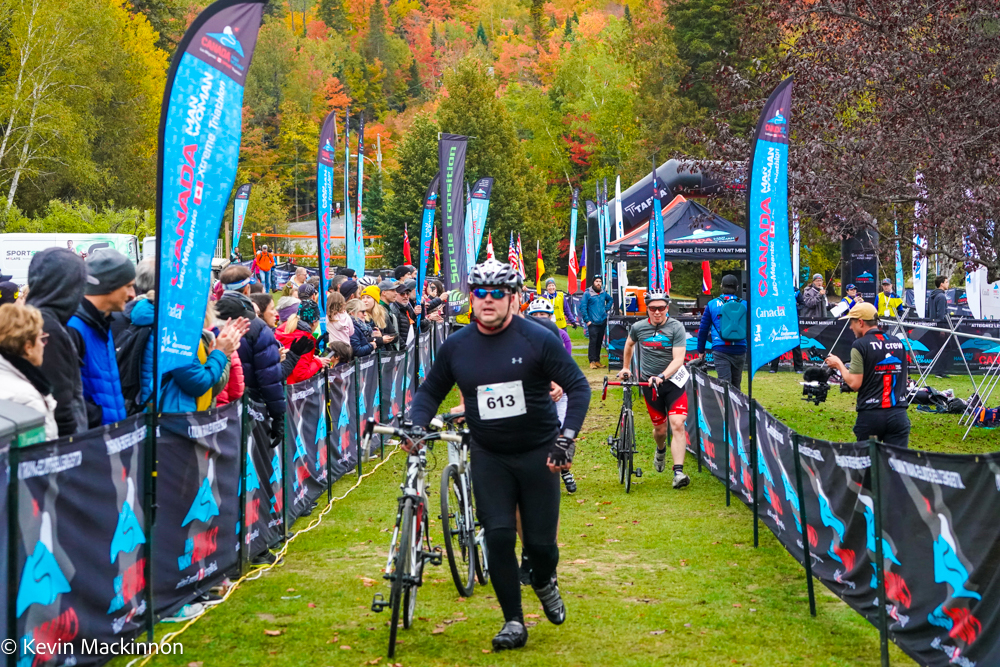Things triathletes wished they’d known before their first race
You'll never forget that first tri
 Photo by:
Kevin Mackinnon
Photo by:
Kevin Mackinnon
We’ll never forget our first triathlon, will we? There’s a reason experience is such a huge factor in this sport – there are some things that you just need to feel yourself to truly understand. For those who are embarking on their first triathlon this summer, we asked some of our readers what they wished they would have known before they did their first swim, bike and run event.
Swimming Challenges
The first leg of the race can be very daunting, especially for those who are new to swimming. So, be warned, up at the front of the race it can be pretty aggressive. Unless you’re gunning for the win, you might want to hang back and let the big pack swim ahead.
- “People pull on your leg and then swim over you,” Richard Clark remembers.
- “Pool swimming does not translate well to open water,” warns Sean Green.
- “Don’t waste time on a porta potty if you just have to pee – go in the water before you exit the swim,” says one Ironman World Championship veteran.
Equipment Issues
There’s a lot of equipment to figure out in a triathlon, especially if you’re coming to the sport from running!
- “The zipper is supposed to be on the back of the wetsuit, not the front,” points out triathlon coach Cindy Lewis Caballero.
- “I wish I’d known that getting a tri suit was a lot more efficient than changing into cycling shorts,” Susie Grondin remembers.
- April Rice provides a list of things first timers should think of before their first race: “Elastic laces, always train with the nutrition you’ll race with, put your helmet upside down on your handle bars the right way (so you don’t race with it on backwards!) and, if it’s dark/cloudy, flip your shoes over so they don’t get filled with water if it rains.”
- “Remember to leave your bike helmet back in the transition zone,” James Swinnerton says. “Did it three times – sometimes you just have to laugh at yourself.”
- “You’re supposed to take off your gloves and helmet when you start the run,” Hammy Handwerker reminds us.
- “That cycling with helmets is compulsory,” Again Ashlagi reminds us.
It’s not like riding a bike
It’s amazing how much harder it is to ride a bike after you’ve done a swim first:
- “A very strong cyclist friend of mine did his first triathlon and said that he was surprised that it didn’t matter how strong of a cyclist he was, because he was so wrecked from the swim and lack of swim training that he was brutally slow on the bike,” Ironman champion Jeff Symonds says.
- “Brake in advance of the dismount line to prevent slamming on the brakes and going over the handlebars,” advises Ultraman world champion Tara Norton.
There’s a reason they call it a brick
And, if it’s hard to ride a bike after you’ve been swimming, running after you’ve done a swim and a bike … well, it’s a challenge in and of itself.
- “I think my favourite thing about my first triathlon was the experience of going from the bike to run and feeling my legs and thinking…. oh, is that why they call it a brick?” says 70.3 champion Tenille Hoogland. “I started laughing at how poorly prepared I was for that feeling and that I was so glad it was a sprint!”
- “That running after cycling would be way different than running alone,” remembers Toughman race director Richard Izzo.
- “That my legs would not work properly and feel so heavy, like two massive tree trunks, when I got off the bike and tried to “run”!” remembers race announcer Steve Fleck.
- “It’s normal to feel like an elephant when you first start the run,” says multiple Ironman World Championship qualifier Bo Arlander.
Post-race lessons
Once you’re finished the race, you might want to be careful about how much celebrating you do, some of our readers suggest:
- “Not to drink Dom Perignon champagne post a 13:45 Ironman,” JoAnn Clifford-Daxner suggests. “It doesn’t mix well with warm blue Gatorade.”
- “I wish I had know that ‘I did a triathlon yesterday’ is not an acceptable excuse to show up to work a couple of hours late on Monday morning,” Symonds says. “I remember totally thinking that was legit, but my boss at the time… not so much. Though I didn’t get fired.”
